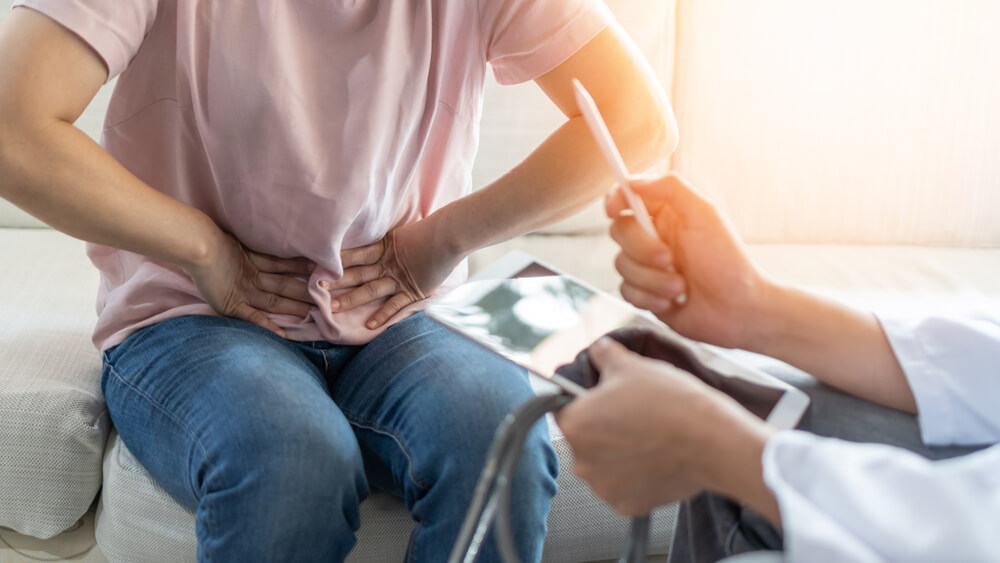By definition, hernias occur when an organ manages to push through the tissue that holds it or through a muscle opening. When assessing different types of hernias, one example would be the intestines pushing through a weak abdominal wall area.
They most often occur around the abdomen, but they can also happen in the groin and upper thigh areas.
Fortunately, an untreated hernia isn’t a fatal problem, but only hernia surgery will be able to resolve the problem, especially when the hernia would lead to other serious complications.
Different Types of Hernias
Before learning about how to prevent hernias, let’s see the different types of the condition:
- Inguinal hernia: These are the most common types, occurring when the intestines manage to get through the lower abdominal wall.
- Umbilical hernia: These affect babies and children, occurring when the intestines push through the abdominal wall in the belly-button area. The bulge around the site is pretty easy to spot, and it’s the only one that can go away on its own as the muscles of the abdominal wall get stronger over time. At the same time, adults may also develop this type of hernia.
- Hiatal hernia: These occur when a part of the patient’s stomach pushes through the diaphragm, reaching the chest cavity. When assessing different types of hernias, these are among those which may lead to more serious problems. These hernias will mostly always cause gastroesophageal reflux disease
- Ventral hernia: This happens when tissue protrudes through the abdominal muscle openings. These usually become smaller when you lay down. These types of hernias are mostly acquired due to strenuous activity, obesity, and pregnancy. They may also appear at surgical incision sites.
Hernia Symptoms

Before you learn how to prevent a hernia, you should first know the most common symptoms.
Obviously, the most common symptom is a lump or bulge in the affected site. In some cases, the bumps may decrease in size or disappear when lying down. These bulges may be felt when coughing, standing up, or bending down. They may also cause discomfort, and lying down may be the only effective form of hernia pain relief.
In other cases, hernia pain relief becomes even more complicated, as some types of hernias (like hiatal hernias) can have even more peculiar symptoms. Trouble swallowing, heartburn, and chest pain may all appear in their cases.
However, in other cases, you will need no hernia pain relief, as they may cause no pain at all and are discovered during a routine exam.
Causes
For the most part, people develop hernias because of a combination of muscle strain and weakness.
Common causes may include:
- Congenital conditions
- Aging
- Weakened muscles due to surgery
- Lifting heavy objects (like weights)
- Chronic coughing and COPD
- Constipation
- Being obese
- Pregnancy
- Ascites
Managing an Untreated Hernia
Apart from an umbilical hernia in children, the only way to resolve all the problems of an untreated hernia is through hernia surgery.
However, depending on the size of the bulge and the severity of the symptoms, your healthcare professional may simply monitor the hernia (watchful waiting).
In other cases, the doctor may recommend wearing a supportive undergarment (a truss) for your untreated hernia, keeping it in place more effectively.
You may also get OTC for hernia pain relief in the case of a hiatal hernia to reduce stomach acid.
Diagnosis
As mentioned above, in some cases, your untreated hernia may produce no symptoms and might be discovered during a routine exam.
When you’re specifically visiting the doctor because you suspect you might have an untreated hernia, your healthcare provider may feel for the bulge in the suspected area, while you’re standing up, coughing, or straining.
The doctor will also ask about your medical history and other questions like whether you lift weights, exercise rigorously, or have a hernia history in the family.
Additionally, your doctor may also perform:
- An abdominal CT scan
- An abdominal ultrasound
- An abdominal MRI scan
In the case of hiatal hernias, experts may also perform:
- Digestive tract X-rays
- Endoscopy
Can Hernias Go Away with Home Remedies?
Unfortunately, untreated hernias can’t go away on their own. Even then, there are a few things you can do to get hernia pain relief.
For starters, eating more high-fiber foods (like whole grains, fruits, vegetables) can help with constipation which is known to aggravate hernias.
In the case of a hiatal hernia, avoiding heavy and large meals and avoiding foods that may cause acid reflux may also ease symptoms.
Other lifestyle changes may also help:
- Quitting smoking (to avoid acid reflux)
- Keeping your bodyweight optimal
- Strengthening core muscles with the help of a professional
- If you train, make sure to perform the exercises properly
Dealing with an Untreated Hernia
Can hernias go away? Not on their own. Additionally, they can also lead to fatal complications if not treated in time.
It’s vital to visit your doctor if you suspect you’ve developed a hernia. Early detection and lifestyle changes can ease symptoms, but you will need hernia surgery to treat the condition entirely.
You don’t have to worry because the patient outlook for hernia surgery is good. However, the problem may come back after surgery, depending on your overall health, lifestyle, and the severity of your symptoms.
How to Prevent Hernia?
Sadly, you can’t always prevent them from occurring. Often, a hernia will develop because of previous surgeries or inherited existing conditions.
However, a few simple lifestyle changes can help you lower your chances of developing one.
So, how to prevent a hernia if you don’t have a family history of having them and had no previous surgeries?
Here are a few tips:
- Avoid developing persistent coughs
- Quit smoking
- Keep your body weight in check
- Avoid straining during urination and bowel movements
- Create a high-fiber diet
- Strengthen your abdominal muscles through exercise
- Avoid lifting too heavy weights.
Hernia in Infants & Pregnancy

Up to 25 percent of babies are born with umbilical hernias, mostly due to low birth weight or premature birth.
Spotting these hernias is relatively easy because they are noticeable when the baby’s coughing or crying near the belly-bottom area. These hernias are mostly painless in most cases, but they can cause vomiting, swelling, and discomfort. In these cases, emergency medical attention is needed.
Fortunately, these hernias will go away as the child’s core muscles strengthen, but if they are still visible by age five, surgery might be recommended to remove them.
If you’re pregnant and suspect a hernia, don’t hesitate to see your doctor, as they can evaluate the condition and determine the best course of action.
In most cases, the hernia won’t be treated only after delivery. However, if it gets larger over the course of the pregnancy and causes discomfort, doctors may advise opting for surgery (during the second trimester).
Previous hernias can also return with new pregnancies and may also happen after having a C-section. Whatever the causes may be, it’s always best to consult with your doctor.
Don’t Wait With Hernias
Even if they don’t produce any symptoms, hernias should always be assessed by a doctor. Early detection can go a long way in avoiding complications and help you resume your everyday life.
Also, making certain lifestyle changes can help you prevent the condition. If you exercise, always strive to maintain proper form and avoid lifting weights that are too heavy for you.
Lastly, if you suspect having developed a hernia, don’t hesitate to reach out to us.


